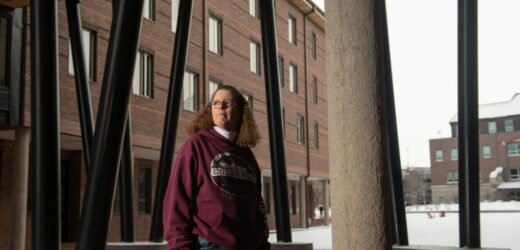After losing their job during the pandemic, Ev Evnen was deeply relieved when the federal government paused student loan payments in 2020.
The Denverite was able to use the $350 they were paying each month toward their $63,000 in student debt to instead help cover rent, food, caring for their dogs and medical care.
“I don’t even consider retirement,” the 34-year-old said. “My retirement plan is dying.”
Evnen is among the 773,000 Colorado borrowers carrying a collective $28 billion in federal student loan debt, according to government data. The pandemic-prompted pause on federal student loan payments afforded some Coloradans an opportunity to save like they never have before while providing others enough money to simply keep food on the table.
In March 2020, most federal student loan payments, as well as accumulating interest, were put on hold for six months when Congress passed the CARES Act, the $2.2 trillion economic stimulus package designed to offer relief as COVID-19 shut down much of the country.
President Donald Trump pushed that student debt relief into 2021, and President Joe Biden — who campaigned on forgiving student loan debt — followed suit, extending the payment pause again. It’s now set to expire May 1, though there have been signs Biden could extend it again.
Student loan help
Need help resolving issues with your student loans? Or just have questions? Contact Kelsey Lesco, Colorado’s student loan ombudsman, at 720-508-6975 or [email protected].
White House Chief of Staff Ron Klain said on the “Pod Save America” podcast earlier this month that Biden “is going to look at what we should do on student debt before the pause expires, or he’ll extend the pause.” And Politico reported last week that Education Department officials told companies that manage federal student loans to hold off on alerting borrowers that payments are about to resume.
On Thursday, Colorado Attorney General Phil Weiser urged U.S. Attorney Cole Finegan to evaluate federal student loan bankruptcy cases to ensure borrowers facing “undue hardship” in paying their student loans receive “the grace promised to them” in the U.S. Bankruptcy Code, according to a news release from Weiser’s office.
“The past two years highlighted the challenges student loan borrowers can face and the importance of grace for those in difficult circumstances,” Weiser said in a statement.
Whether the payment pause gets extended again or not, hundreds of thousands of Colorado borrowers — and tens of millions nationwide — are feeling the pressure of a looming deadline that will siphon hundreds of dollars per month from their wallets in the name of higher education.
“We are concerned people are not going to be set for repayment,” said Kelsey Lesco, Colorado’s student loan ombudsman.
To help ease the transition back to payment, Lesco urges borrowers to make sure they know who their loan servicer is, since many left the market during the pandemic and transferred their borrowers’ loans to other companies. People should also update any banking information that’s changed in the last two years and check with their loan servicers to make sure their auto-debit is turned back on if they want to make direct deposits, she said.
Two years into the pause, The Denver Post spoke to five Coloradans to get a sense of how the break in payments impacted their lives.
From housing insecure to a down payment
Mike MacFerrin said the pause in student loan payments staved off homelessness for himself and his family.
The 42-year-old racked up more than $90,000 in student debt while attending graduate school at the University of Colorado Boulder from 2010 to 2018 and raising three children. MacFerrin earned a master’s degree in computer science and his Ph.D. in geography, which he put to use through a job measuring the size of glaciers.
On his income-based repayment plan, MacFerrin was making around $450 a month in student loan payments prior to the pause. His annual interest rate on the loan is 6.5%, and he owes more now than he did when he graduated, despite paying part of the balance down monthly.
Working as a postdoctoral researcher in 2020 with a wife whose main source of income was studio portrait photography, MacFerrin said money was tight once the pandemic hit.
“Not having the loan payment helped us survive,” MacFerrin said. “When I was unemployed briefly and still had kids to feed and rent to pay, any savings we had was pretty quickly drained.”
MacFerrin and his wife ended up finding more stable employment. Without a loan payment dangling over their heads, the family was able to save for a down payment on a house in Longmont with the help of a first-time homebuyer program through the university.
The family, which had crammed into a small university housing apartment, moved into their new home in July.
“If we had been paying those payments the entire time, I honestly don’t know if we would have been able to gather any sort of savings and been able to get the place we did,” MacFerrin said. “The pause really enabled that for us.”
With the deadline looming, MacFerrin is prepared to scrounge for money again.
“I don’t think it’s going to put us out on the street, but it’s going to make things stressful,” MacFerrin said.
Robbing Peter to pay Paul
Sandi Polasek was raised to believe that if you buy something, you pay for it. The 54-year-old wants to pay off her nearly $60,000 in student debt from California’s Hope International University, where she earned a bachelor’s degree in human development in 2019.
“I like to pay my debts, but I have to be alive to do it, and this debt is just about killing me,” Polasek said.
Polasek lives in Aurora, renting an apartment she shares with her adult son, who has autism.
The single mother said she wanted a degree to better her life and fulfill her dream of working with children. Polasek, an assistant early childhood teacher, is grateful for her education, but now makes barely $21 an hour and couldn’t afford the $400 student loan payments she was being billed. Her loan total is higher now than it was when she graduated due to interest, she said.
Polasek defaulted on her student loan more times than she can count, opting to feed her son and keep a roof over their head, she said.
“I robbed Peter to pay Paul,” Polasek said. “I wouldn’t turn on my heat for a month and double up on my clothes so we’d wear two layers of clothing to keep warm so I could make a payment once in a while. I could pay about $50 a month, but they won’t accept that. I just don’t have the money.”
When the pause took effect, Polasek said her mental health improved without constant calls about her missed student loan payments. During the break, Polasek said she’s been able to nurse her credit back to health and hopes to be able to afford a used car.
“I try not to think about the payment restarting because it would make me depressed and I don’t know that I’d be able to function very well,” Polasek said. “Maybe if we can lower the payment next time. Maybe they’ll listen.”
“I’m literally telling everyone I know”
A few days after being interviewed by The Post about her $33,000 in student debut, University of Northern Colorado graduate Leslie Costley reached back out to the reporter.
“I just submitted my final student loan payment today, and I had no idea I’d be this excited,” the 37-year-old Denver resident wrote in a text message. “I’m literally telling everyone I know, which includes you. Thank you for indulging me, I’m going back to my ridiculous dance party.”
When the payment pause struck, Costley, who graduated in 2009, decided to keep chipping away at her loan balance at a reduced rate — paying about $200 a month instead of $350.
Costley and her husband are public school teachers, so they both kept their jobs during the pandemic.
“We knew we were in a better situation than a lot of people,” Costley said, noting that she and her husband bought their home in 2008 with the help of the U.S. Department of Housing and Urban Development’s Good Neighbor Next Door program. “We made an effort to donate to charity, cook meals and drop them off at our friends’ houses because they were laid off and we weren’t.”
The pause — and lack of accumulating interest during that time — allowed Costley to finally pay off her loans after 13 years. In addition, she was able to pay off her car loan and take care of unexpected veterinary bills that popped up without too much financial worry.
Now, the couple will turn to focus on paying off her husband’s $500-a-month student loan when the repayment begins.
“When my son is old enough to go to college, I’m going to be one of those people who’s like, ‘Hey, man, maybe just get a job and take a couple years and decide what you want to do instead of making a decision when you’re 17 and having to pay for it until you’re in your late 30s.’ ”
“So predatory”
Lauren Turow, 33, was the first person in her family to go to college. The Lakewood resident said she had no idea what she was doing when she was 18 and accepted tens of thousands of dollars in student loans, aside from trying to earn her degree like she thought she was supposed to.
Turow earned a bachelor’s in psychology and a master’s degree from a State University of New York school, graduating while juggling three part-time jobs in 2016 with $64,000 in debt at an 8% interest rate. Despite paying $700 a month, she now owes more than the original loan is worth, thanks to the interest.
“I have not made a single dent in my principal,” Turow said, referring to her original loan total. “Even if they don’t forgive student loans, the least they can do is stop collecting the interest because that’s what’s so painful. This is so predatory on young adults. I didn’t know when I was 18 this was going to be what I would have to deal with. I’m paying more interest than on a mortgage. This is crazy. It’s unrealistic to expect anyone to be able to pay these types of things back and there wasn’t enough education on it.”
Without having to pay $700 a month during the pause, Turow has built up savings for the first time in her life.
Between Turow and her husband, the couple has been able to put away $15,000 in savings over the past two years.
“We want to maybe one day buy a house, but if I have to start paying my loans again, not only is that going to stop me, it’s likely going to dip into what we’ve been able to save anyway,” Turow said.
Redefining milestones
Evnen now works in nonprofit consulting along with a job at a Hebrew school. They have vowed to use this year to get their budget back on track, decreasing spending and increasing income as much as they can while still saving for costly gender-affirming surgery, which insurance may or may not cover.
The $63,000 in student debt Evnen acquired from a graduate degree in nonprofit management hangs over their head.
“I try to just not think about it too much and realize I’m going to have less money because it’s easy to spiral down a rabbit hole thinking about this huge sum of money that I can never pay off,” Evnen said. “I try to just think of it as a big number I’m never going to pay off and it’s just there, looming in the background.”
Evnen’s debt has meant redefining typical adult achievements.
“The milestones I want for myself are to be connected with people I love and connect with my community as opposed to financial markers that indicate that I’m ‘doing a good job,’ because those things are not going to happen for me in the timeline I thought they would,” Evnen said. “I had to redefine what success looked like to me.”
Source: Read Full Article


